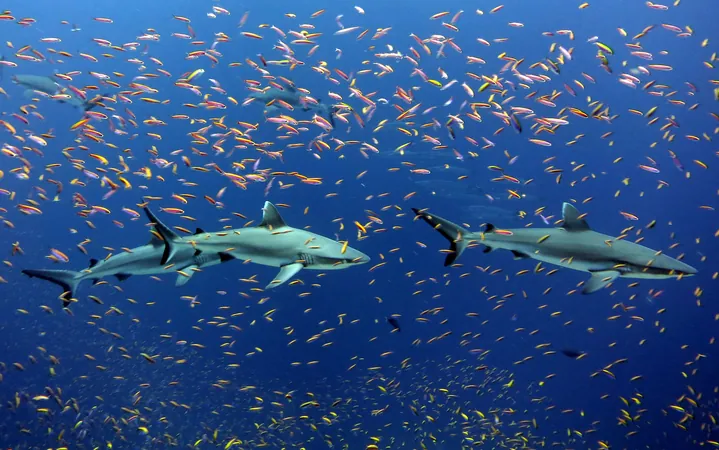
Sharks Are Key to Thriving Coral Reefs: New Study Reveals
2025-04-09
Author: John Tan
The Crucial Role of Sharks in Coral Ecosystems
A groundbreaking study conducted by researchers from the UK and Australia has confirmed that the resurgence of apex predators, particularly sharks, is vital for restoring ecological balance in coral reef ecosystems. This exciting research highlights how healthier environments emerge when shark populations thrive.
Shark Comeback Boosts Reef Diversity
Detailed observations were made at Ashmore Reef off Western Australia's coast, where researchers noted a striking correlation: as shark populations increased, so did the numbers of large and mid-sized predatory reef fish, while smaller species began to decline. This finding underscores the importance of top predators in maintaining a diverse reef community.
Insights from Comprehensive Research
The collaborative project between the University of Glasgow, the University of Western Australia’s Ocean Institute, and the Australian Institute of Marine Science, published in Animal Ecology, meticulously analyzed underwater video footage from before and after the reef’s designation as a 'no-take' zone in 2004.
Researchers compared footage from 2004, a time when sharks were scarce, with footage from 2016, showcasing a significant recovery in shark numbers. Their findings reveal that smaller mesopredatory fishes adjusted their behavior when larger predators were present, becoming more cautious and foraging less.
The Consequences of Overpopulation
An overpopulation of any species can disturb the delicate equilibrium of coral reefs. If smaller mesopredatory fish proliferate unchecked, they can overconsume juvenile fish and invertebrates, severely disrupting the food chain.
Sharks Restore Ecological Balance
The presence of apex predators like sharks is critical for restoring this balance. The study's authors argue that Ashmore Reef illustrates how pristine conditions should manifest, emphasizing the vital role big predators play in preserving diverse marine ecosystems.
Professor Killen's Call to Action
Professor Shaun Killen from the University of Glasgow emphasized the importance of conserving top predators. He stated, "Their return not only boosts population numbers but also restores vital ecological interactions necessary for healthy marine life. Removing these predators can destabilize ecosystems, leading to erratic changes harmful to reef health."
A Global Perspective on Shark Decline
The findings from Ashmore Reef are echoed in a long-term study of the Great White sharks in South Africa's False Bay, where a dramatic decline in their populations over two decades has led to similar ecological imbalances. Factors such as overfishing and orca predation have been attributed to their decline.
Behavioral Changes in Prey Species
Dr. Mark Meekan from the University of Western Australia’s Ocean Institute noted that effective protection measures for Ashmore Reef had allowed shark populations to flourish since 2008. This resurgence permitted researchers to study how these predators influence the behaviors of their prey, showcasing the far-reaching impacts that apex predators have on reef communities.
The findings suggest that prey species may curtail essential activities like reproduction and foraging while evading predators, which further underscores the intricate balance that exists within marine food webs.
Conclusion
The research, titled "Recovery of Reef Shark Populations Invokes Anti-Predator Behaviours in Mesopredatory Reef Fish in a Coral Reef," adds to a growing body of evidence highlighting the indirect but critical effects of predators on food chains. It serves as a clarion call for conservation efforts aimed at protecting these magnificent marine creatures and the ecosystems they sustain.



 Brasil (PT)
Brasil (PT)
 Canada (EN)
Canada (EN)
 Chile (ES)
Chile (ES)
 Česko (CS)
Česko (CS)
 대한민국 (KO)
대한민국 (KO)
 España (ES)
España (ES)
 France (FR)
France (FR)
 Hong Kong (EN)
Hong Kong (EN)
 Italia (IT)
Italia (IT)
 日本 (JA)
日本 (JA)
 Magyarország (HU)
Magyarország (HU)
 Norge (NO)
Norge (NO)
 Polska (PL)
Polska (PL)
 Schweiz (DE)
Schweiz (DE)
 Singapore (EN)
Singapore (EN)
 Sverige (SV)
Sverige (SV)
 Suomi (FI)
Suomi (FI)
 Türkiye (TR)
Türkiye (TR)
 الإمارات العربية المتحدة (AR)
الإمارات العربية المتحدة (AR)